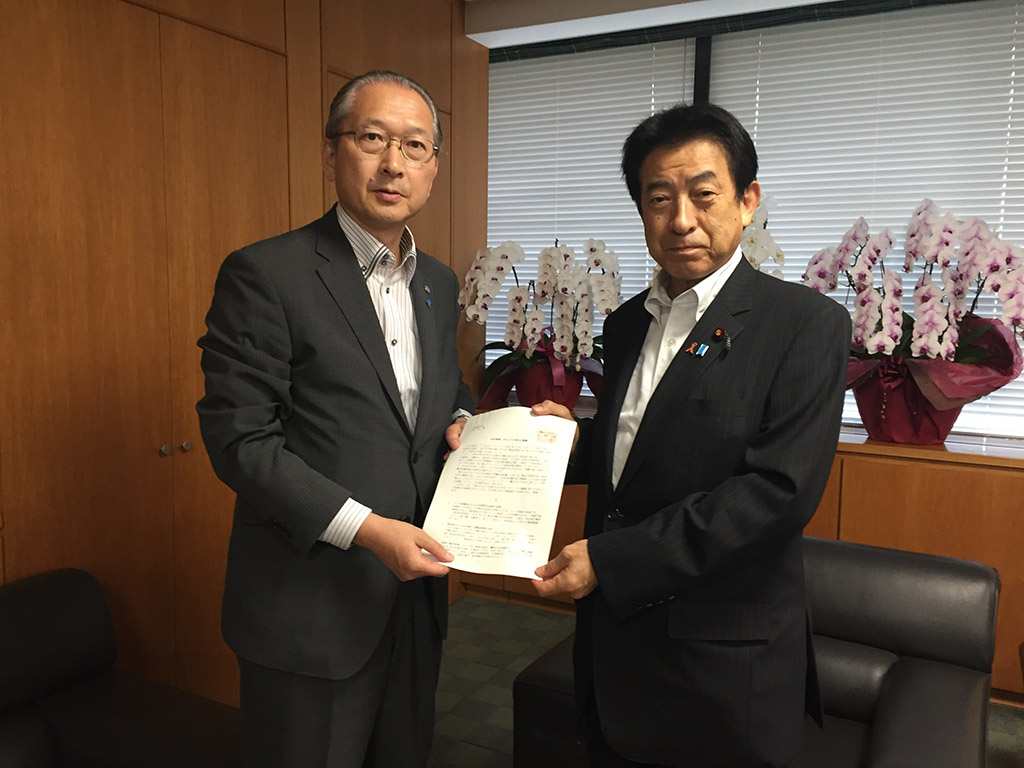HOMEUpdates
Updates
RENGO News
Requests to the Minister of Health, Labour and Welfare in the Approach to the G20 Summit, Hangzhou
01 September 2016
On the afternoon of September 1, President Kozu of the Japanese Trade Union Confederation (RENGO), met with Yasuhisa Shiozaki, the Minister of Health, Labour and Welfare. After delivering a letter of request to Prime Minister Abe, President Kozu pointed out the current situation by stating, “The number of unemployed persons in the world is approaching 200 million and non-regular employment is increasing dramatically not only in the developed countries but also in the newly emerging countries. Real income is not rising for 65 to 70% of households, around 580 million people, in the advanced economies. Moreover, in many countries, including Japan, the flexibility of the labor market and the weakening of regulations for worker protection are advancing without sufficient social dialogue.” With this in mind, President Kozu requested that the Japanese Government display leadership to ensure that the following matters are agreed upon and implemented without fail at the G20 Summit to be held in Hangzhou on September 4 and 5.- The realization of inclusive growth through expanded investment in people
- The implementation of investment in people to realize sustained, stable and inclusive growth.
- Make efforts to improve the environment aimed at “raising and supporting the base level” and “correcting disparities” for non-regular workers and workers in small and medium enterprises in line with the Sustainable Wage Policy Principles (adopted at the 2016 G20 Labour and Employment Ministerial Meeting) in order to guarantee wage rises by means of the expansion of demand and job creation.
- The implementation of new structural policies to correct disparities
- In 2015, the G20 leaders, recognizing the close relation between the labor income share and inequality, pledged to create a more inclusive labor market. In line with this pledge and the Sustainable Wage Policy Principles, and through social dialogue, guarantee the realization of quality job creation, wage increases and the correction of disparities.
- Practical action toward improvements in youth employment, the correction of gender gaps and migrant integration
- To achieve the “G20 Youth Target,” take action to realize quality employment and employment opportunities for all young people through cooperation between labor and employers, the expansion and improvement of vocational education and training, the provision of appropriate information when seeking employment, encouragement to transform jobs to regular employment, and other means.
- To realize the G20 target of the gender labor force participation rate by 25% by 2025, consolidate an environment that promotes the care economy, corrects the gender wage gap, and enables the continued employment of women.
- As a response to the refugee problem, push forward the establishment of an inclusive support system that includes daily life consultation, language acquisition, securing of medical care, educational access support, stable housing, vocational education and training, job placement support, and so on.
- Practical measures and the exercise of leadership for the COP21/CMP11 Paris Agreement and measures for technological innovation
- While aiming for a transformation to a “green economy” that makes possible compatibility between “environmental protection" and “economic development," put in place the necessary countermeasures (a just transition) to ensure that economic and social change does not lead to adverse impacts on employment.
- In COP negotiations, while taking into account the views of a wide range of stakeholders, bring the Paris Agreement into practical reality as just and effective action, and make efforts to mitigate GHG releases that all member states participate in with a view to securing a sustainable global environment.
- To adapt adequately to technological innovation such as IoT, big data, artificial intelligence, and so on, support capital investment and R&D aimed at the creation of new value by innovation in companies.
- Strengthen support for re-learning by working people as they adapt to the changing industrial structure, and for vocational human resource development by companies.
- Securing decent work in trade, development and in the supply chain as a whole
- To protect workers' rights and secure safe workplaces, incorporate compliance clauses for core labor standards in multilateral and bilateral free trade agreements and economic partnership agreements.
- Move forward toward the attainment of the 2030 Agenda for Sustainable Development that upholds “the promotion of decent work” as one of its targets.
- To realize an appropriate distribution of the value added generated over the whole supply chain, formulate and implement action plans for each country based on the UN Guiding Principles on Business and Human Rights and strengthen the function of the national contact points (NCPs) with regard to the OECD Guidelines for Multinational Enterprises
- Strengthen policy consistency in the approach to the 2017 G20 in Germany
- Implement the Labor and Employment Ministers and Financial Ministers Joint Meeting for the 2017 G20 at an early date.
- Recognizing the importance of social dialogue, establish forums for consultation with L20 and B20 in both the G20 Leaders Meeting and Cabinet Ministers Meetings.
